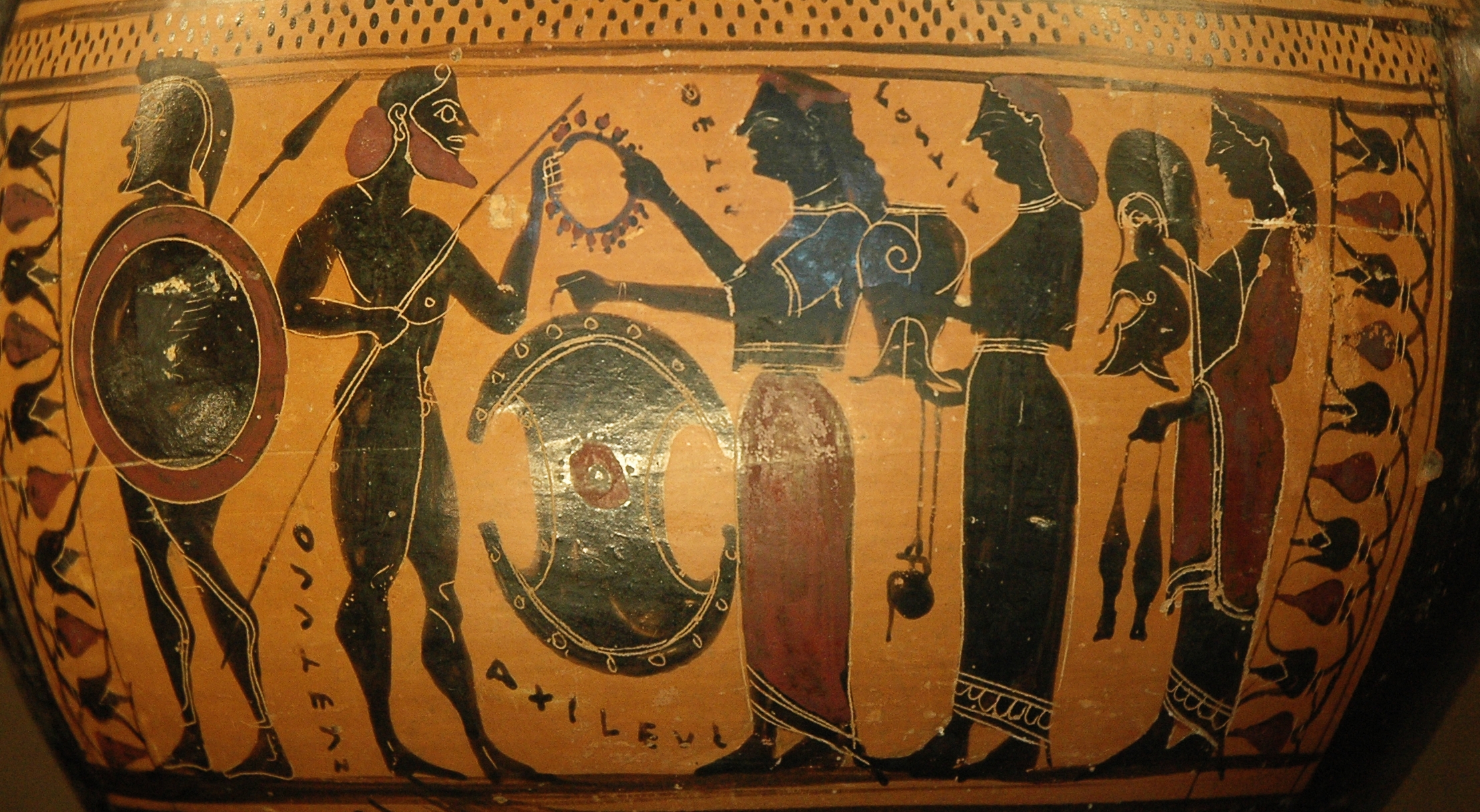
July 13, 2014, by Richard Rawles
Classics and the First World War: ‘Stand in the trench, Achilles’
A hundred years since the summer of 1914: people’s minds are turning to the First World War. I thought it might be of interest to spend a little time here drawing attention to some of the various ways in which this war was experienced, described and commemorated in connection with Classics.
This poem was composed by Patrick Shaw-Stewart in July 1915, when he was fighting in the Gallipoli campaign, in the Thracian Chersonese, i.e. the northern side of the Dardanelles, close to the site of ancient Troy; here, as often in literature ancient and modern, war is described through Homer, especially the Iliad (my students and I discussed this poem in a seminar on receptions in my Iliad module last year). He writes when returning to the Chersonese from three days of leave on the island of Imbros.
I saw a man this morning
Who did not wish to die:
I ask and cannot answer,
If otherwise wish I.
Fair broke the day this morning
Against the Dardanelles;
The breeze blew soft, the morn’s cheeks
Were cold as cold sea-shells.
But other shells are waiting
Across the Aegean Sea,
Shrapnel and high explosive,
Shells and hells for me.
O hell of ships and cities,
Hell of men like me,
Fatal second Helen,
Why must I follow thee?
Achilles came to Troyland
And I to Chersonese:
He turned from wrath to battle,
And I from three days’ peace.
Was it so hard, Achilles,
So very hard to die?
Thou knewest, and I know not —
So much the happier I.
I will go back this morning
From Imbros over the sea;
Stand in the trench, Achilles,
Flame-capped, and shout for me.
Shaw-Stewart was 26 years old when he composed the poem. He had been a stellar student of Greek and Latin at Eton and at Balliol College, Oxford, and knew Greek literature intimately. The poem shows the narrator considering the possibility of his own death by thinking about Achilles in the Iliad (the Odyssey too: Odyssey 11.488-91, spoken by Achilles’ ghost, is – almost – Achilles’ answer to the question ‘what is it like to die?’). In describing Helen as ‘hell of ships and cities, / Hell of men like me’ the poem also draws on the punning description of Helen as helenas, helandros, heleptolis ‘ship-destroying, man-destroying, city-destroying’ at Aeschylus Agamemnon 689-90.
The poem closes with a prayer to Achilles: let him appear, ‘flame-capped, and shout for me’. It seems as if Achilles’ presence in the trench can protect the speaker. Here the poem alludes to Iliad 18.202ff.: here, Achilles has decided to rejoin battle after Patroclus’ death, but because he lacks armour cannot fight. Athene kindles a supernatural fire from his head and he steps to the parapet ‘by the ditch’ of the Greek camp (the analogy with a trench is easy) and makes a battle-cry, which makes the terrified Trojans retreat. On the basis of this passage, then, Shaw-Stewart’s Achilles is asked to appear and protect him, a kind of rescuing Superman figure who can make danger go away – which is to say, I suggest, like a father.
This is a very particular passage in the Iliad: more often we see Achilles in his tent, withdrawn from the fighting, or, in the last books, as a ferocious warrior, and he may seem too youthful to be a parent. But Achilles as a parent is there in the poem. At 9.323-6 he compares himself to a mother bird working to feed her chicks. At the beginning of the sixteenth book, the simile with which he crossly needles Patroclus implicitly casts himself as the mother of a little girl. It is a striking sign of Achilles’ imagination that he twice compares himself to a mother rather than a father.
For all that, the Iliadic Achilles is a father: at 19.326-7, and perhaps also 24.467, we find that he has a son, Neoptolemus. Achilles says that he does not know whether his son is alive. For fuller exploration of Achilles as a father-figure, we must turn elsewhere: above all, to Sophocles’ Philoctetes, in which Neoptolemus is a young man growing up without his great father, who has already died at Troy.
Shaw-Stewart died in France in December 1917. The poem was found after his death, written (almost inevitably) on the fly-leaf of his copy of the work of another classicist-poet, A.E. Housman’s A Shropshire Lad.
If Classical receptions in the British poetry of the First World War interest you, there is a great book by Elizabeth Vandiver, on which I have drawn above, and which I strongly recommend. Among its many strengths is that it treats poetry with classical content by a wide variety of people of different classes and educational backgrounds: it was not only super-classicists like Shaw-Stewart who turned to antiquity to make sense of the war.
Picture: Paris, Louvre E869. Thetis gives armour to Achilles, so that he can return to battle. Attic black figure hydria, ca. 575-550 BC. Public domain.
https://en.wikipedia.org/wiki/File:Hydria_Achilles_weapons_Louvre_E869.jpg

The example of Achilles has also been used by psychologists to try and understand war trauma. Jonathan Shay, a psychiatrist who treated Vietnam War veterans, argued that The Iliad provided – in some ways – a deeper and more complex understanding of war trauma than post-traumatic stress disorder. He took the argument further in comparing the Odyssey with the experiences of war veterans, and the difficulties they have at home.
Thanks, Nigel: here is another interesting example of approaching combat trauma through ancient literature about the Trojan War.
http://www.ldnews.com/local/ci_26258767/fort-indiantown-gap-host-dramatic-reading-sophocles-ajax